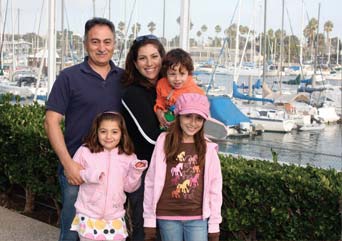 “It’s a strange story,” starts Shant Kenderian (left, with his family), MS, PhD ’02,
over the phone from his lab in Southern California. “So how much do you want to know?”
“It’s a strange story,” starts Shant Kenderian (left, with his family), MS, PhD ’02,
over the phone from his lab in Southern California. “So how much do you want to know?”
During the summer before his senior years of high school in 1980—he’d just taken the SAT exam so he could apply to engineering schools that fall—Kenderian returned to his native Baghdad to see his estranged father.
When the Iraq-Iran war broke out, despite status as a permanent U.S. resident, his Iraqi citizenship prevailed and he was not permitted to leave. After earning an undergraduate degree in engineering, he was forced into military service. He hatched a plan to be captured by the Americans, expecting to be liberated in their hands. Instead they suspected he was a Saddamite spy and held him as a prisoner of war. The details are wrenching and powerful, and best told in his memoir about the experience, 1001 Nights in Iraq (Simon & Schuster, 2007).
Yet his post-POW story is almost as compelling. Back in the United States, Kenderian resumed his plans, earning a master’s degree from Cal State before heading east to the Whiting School for his PhD. Today he lives with his wife and their three children in Pasadena, California.
Q: When you left to visit Iraq, a tremendous set of obstacles interrupted your plan to return to the U.S., yet you never lost sight of that dream. How?
A: When the Americans picked me up, I had a book on nuclear physics and quantum theory. That scared them and they took it away. But I’d known since I was 12 that I would get a PhD in engineering. I had clarity and knew what I had to do. When I was released, I just thought: What do I have to do next? I came back to the United States with only my uniform; no papers to show I had my engineering degree. So I took the Engineer in Training Exam, passed, and Cal State gave me a chance.
Q: How did you end up at Johns Hopkins?
A: I had four cousins there. At the time I was working on the international space station project, and my cousin told me Johns Hopkins had a good materials science program. One thing led to another, and I got to Hopkins. And then I finished my PhD requirements in three and a half years [with a dissertation titled “Advanced Ultrasonic Techniques to Determine the Structural Integrity of Rail Steel”].
Q: Since 2005, you have been with The Aerospace Corporation, doing work in support of the U.S. military. Is that ironic?
A: There’s irony in my whole life. I was a POW held in isolation by the Americans, and now I work with a company doing nondestructive testing on rockets and satellites for the Air Force before they fly. If there’s a problem with a structure, we go ahead and solve it. That all just adds to the irony. Another twist: One of my former interrogators wrote a glowing letter of recommendation for me to get this job. People use “the American dream” as a cliché, but there’s great truth and depth to it.
Q: The Marines held you in isolation. At one point, you had neither a toothbrush nor a change of clothes for almost three weeks. How did you get through that?
A: I asked for my books, instead they gave me a Bible. I started reading it from sunrise to sunset, just to keep my mind busy. I didn’t want my mind to stray out of control. That didn’t keep me focused, just busy. I convinced myself my situation was normal.
Q: How has the experience shaped you?
A: I think things don’t bother me very easily. If there is an obstacle, I don’t get daunted easily. I don’t get overwhelmed. I had a plan and I stuck to it. A lot of people have plans; short-term plans work well, but with long-term plans things begin to slip. The POW experience was tough, but it taught me to be more resilient and patient. I think that helped me through my education, and helps me now as an engineer.




